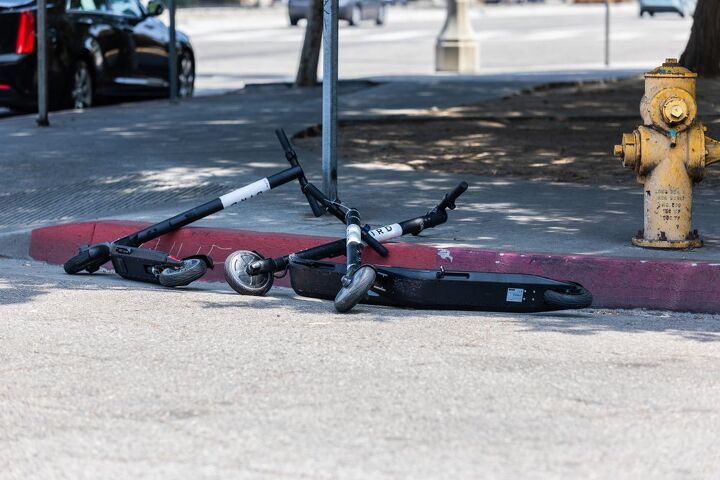Minor Victory: Scooter Companies Abandon Cities Due to Viral Outbreak

Over the last two years, urban landscapes have been marred by a growing number of companies offering street-side scooters for rent. The business model always seemed a little curious, especially as additional players moved into the market. It wasn’t long before plenty of cities had their sidewalks littered with scooters in various states of disrepair and thrill-seekers were using them to dive through traffic, thus frustrating motorists.
They also have to be shared with your neighbors, making them none-too-appeasing in an era where everyone is obsessively washing their hands to avoid the coronavirus. Combine that with cities asking (sometimes demanding) that citizens remain indoors and you can probably guess where this is all going. Scooter providers, already in the delicate position of being “mobility” companies, are reeling things back in.
Though COVID-19 may just be a good excuse. Several of these companies have had issues raising funding and have been forced to cut staff. While there are questions about the sustainability of a business model that charges a pittance for rides but requires constant maintenance and charging of vehicles left on the street, the real issue seems to be their collective focus on growth. Rather than there being one or two big firms competing for market dominance, there were numerous companies trying to expand as quickly as possible. A lot of these new markets probably weren’t viable longterm. But, according to Bloomberg, the coronavirus seems to have accelerated any hardship already coming their way:
Lime’s CEO and co-founder Brad Bao wrote in a blog post on March 21 that the startup is “winding down or pausing” service in all markets but South Korea. Prior to the pandemic, the company operated nearly 120,000 scooters in 30 countries across the Americas and Europe. Bird announced it is removing its fleets in six U.S. cities: Miami and Coral Gables, Fla.; Portland, Ore.; and Sacramento, San Francisco, and San Jose. It had already pulled vehicles from 21 European cities.
Jump, a subsidiary of Uber Technologies Inc., has paused electric bike and scooter rentals in most of its European markets and trimmed the size of its fleets across the U.S. It stopped service entirely in Sacramento at the city’s request. Lyft Inc. has continued to operate its network of mostly docked bikeshare systems in eight U.S. markets. So far, it’s kept dockless scooters available for rent in all urban markets but Miami. Every company with vehicles in circulation said that they have heightened their handlebar sanitation protocols and are encouraging riders to do the same.
That’s far from a comprehensive list of the scooter companies in trouble. None seem to have gone untouched by social distancing measures in urban areas and few went into the health crisis in top shape.
“I think it’s pretty dire,” Emily Castor Warren, a principal and director of policy at the transportation planning firm Nelson\Nygaard and a former director of policy at both Lyft and Lime, told Bloomberg. “If these lockdowns persist, they’re going to have to, at the very least, undertake major layoffs to core teams, because the one cost they can’t bring down to zero is salaries for headcount and real estate for their offices.”
But the doom and gloom is not omnipresent. A few investors are bound to see scooters as a smart way for urbanites to avoid crowding on subway cars and busses. In fact Jump, Lime, Spin, and Wheels are all trying to find ways to partner with local governments and essential service providers through the health crisis. Smaller players may also be able to carve out a portion of the market for themselves as the larger players recede. But that’s assuming the business model for scooter firms is sound and we’re not positive that’s been the case.
[Image: Karl_Sonnenberg/Shutterstock]

A staunch consumer advocate tracking industry trends and regulation. Before joining TTAC, Matt spent a decade working for marketing and research firms based in NYC. Clients included several of the world’s largest automakers, global tire brands, and aftermarket part suppliers. Dissatisfied with the corporate world and resentful of having to wear suits everyday, he pivoted to writing about cars. Since then, that man has become an ardent supporter of the right-to-repair movement, been interviewed on the auto industry by national radio broadcasts, driven more rental cars than anyone ever should, participated in amateur rallying events, and received the requisite minimum training as sanctioned by the SCCA. Handy with a wrench, Matt grew up surrounded by Detroit auto workers and managed to get a pizza delivery job before he was legally eligible. He later found himself driving box trucks through Manhattan, guaranteeing future sympathy for actual truckers. He continues to conduct research pertaining to the automotive sector as an independent contractor and has since moved back to his native Michigan, closer to where the cars are born. A contrarian, Matt claims to prefer understeer — stating that front and all-wheel drive vehicles cater best to his driving style.
More by Matt Posky
Latest Car Reviews
Read moreLatest Product Reviews
Read moreRecent Comments
- Theflyersfan I think color is FINALLY starting to return to car lots. After what seems like over a lost decade of nothing but shades of gray, whites, and black, I'm seeing a lot more reds and blues creeping into luxury car lots. Except Audi and Volvo. They still have at least 6-8 shades of gray/silver. But they at least have a nice green. Honda and Acura seem to have a bunch of new colors. And all carmakers need to take a serious look at the shades of red seen at the Alfa Romeo lot and tell themselves they want that because that looks amazing.
- Bd2 Well, it's no Sonata, no does it have the panache of the Optima.
- Teddyc73 "eye-searingly"?
- Teddyc73 I applaud anyone who purchases a vibrant, distinct or less popular color. We need these people. Our road ways have turned into a dreary gloomy sea of white, black, silver and greys, most with the equally lifeless black wheels. Mr Healey is guilty of contributing to this gloom apparently. It looks like a black and white movie across the nation when grouped with our grey houses with grey interiors. Totally dull and lifeless. And what is with this awful hideous trend of dull grey with black wheels showing up everywhere? It's on everything. Just awful. Come on people! I'll keep my Ram 1500 with it's deep rich sparkling Western Brown paint as long as I can.
- Shipwright As my Avatar shows I had an '08 GT 500, Grabber Orange convertible. I now own a '12 GT 500 Kona Blue coupe.


































Comments
Join the conversation
BTW are there Sport Utility Scooters available? My wife demands one.
I don't understand the hate for these but at the same time I do. It's almost the same as the hate for bicycles. As a long time bicycle rider who pays attention to traffic laws,* readily yields to vehicular traffic when the law says I'm supposed to yield the right of way, generally tries to make eye contact with drivers in those situations or make obvious body language of my intentions, keeps to the right, and someone who *pays* *attention* *to* *my* *surroundings*, I too despise two wheel daredevils who flagrantly ignore or who ignorantly don't bother to learn what their responsibilities are. The bad ones ruin the reputation for all of us. I've rode Birds and Limes in a few cities. It's really easy- act like you're a bicycle, follow traffic lights and signs, be courteous to drivers and pedestrians alike. But again, there are some scooter riders who are jerks. There are bad drivers out there too- the ones who pull out from stop signs and driveways into the path of a motorcycle, the ones who lane change into one because they weren't paying attention to their surroundings (and probably never bothered to learn but long ago convinced themselves that they are "good, safe drivers), the ones who don't know how to accelerate and merge into traffic... Hope that makes sense when I say I don't understand the hate yet at the same time I very much understand the hate. * except for coming to a complete stop at a deserted intersection